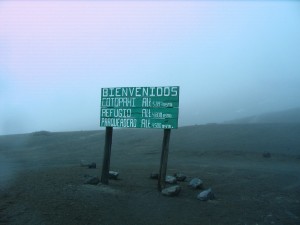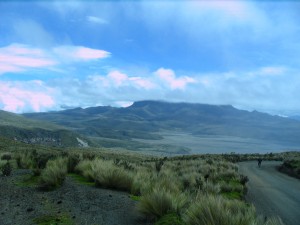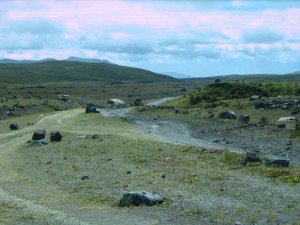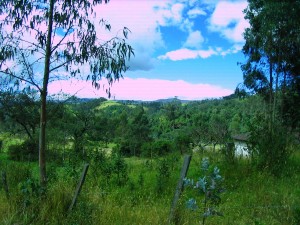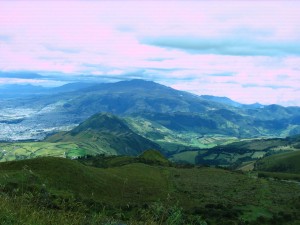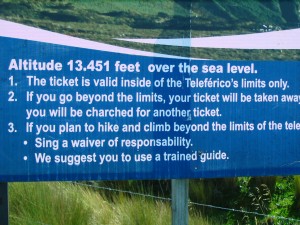The ride back to Quito in the afternoon was a lot shorter than the morning ride — about 1.5 hours vs. 3 hours. And I thought the terrain we rode over was much prettier. But it may have been because the clouds had lifted entirely and everyone else was falling asleep, so I didn’t feel self-conscious about gazing past their heads toward the landscape. We were arranged in two benches, facing each other, kind of like a small army truck. And we made it back at about 4:00, with plenty of time to make the dinner we arranged with some of my former students.
We met them at a mall, unfortunately. And the food we ate was mediocre, but five students showed up — Natalia, Silvia, Maria Sol, Maria Eugenia, and Cesar — and it was a lot of fun to reconnect with them all. The conversation highlighted for me just how much weaker my Spanish currently is than it was during my final months in Quito back in 2005.
I knew when we lived here that there were all sorts of limits to my understanding of Ecuadorian language and culture, but I was learning so much every day, and as a result, I was focused more on what I understood about Ecuador than what I didn’t comprehend.
This trip didn’t hold the same amount of promise in terms of daily revelations. So maybe that’s why I focused on my own deficiencies in understanding.
I tried to over-romanticize it. In fact, on one of our first nights in Mindo, I wrote in my journal about all the ways in which Ecuador is superior to the US. You can catch a bus anywhere and get off anywhere. Travel is cheap. Food is cheap. Adventure tourism is cheap. People are very willing to help you. You ask for directions or tell your hostel owner that you have a slight stomachache and pretty soon you’ve got hand-drawn maps and chamomile tea being brewed for you morning and night. A woman with a small child gets on a bus, and some punk teenager who’s been blasting reggaeton from his cell phone says, “Senora, sientese no mas,” and gives up his seat for her. Perfect strangers will ask you to be their daughter’s god-parents.
Even as I was writing that list, however, I was aware that our being American may have motivated the god parent offer and that the buses pollute horribly and that their lack of formal stops leads to increased congestion and that food/travel/tourism being cheap has more to do with poverty than it has to do with kindness and that for every positive, there’s probably some equal and opposite negative lurking around the corner.
There’s no doubt that the people in Ecuador are/were wonderful to us. But our lack of Spanish mastery and our cultural naivety blinds us to a lot of the social machinations that we see so clearly here in our home culture.
Back home, if I’m standing in line at a grocery store, and the guy ahead of me throws a temper tantrum, calling the cashier a bitch, and adding, “you people are always trying to screw me over,” I would be shocked. I’d feel the tension in the air. I’d feel horrible for the cashier.
In Ecuador, a heated altercation is actually one of the more difficult things to understand. People tend to talk faster, and they throw in a lot of colloquial language or palabrotas (bad words). But even if you do understand the words, you’re comprehending the denotations (dictionary definitions) without necessarily knowing years’ worth of contexts and reactions. You haven’t witnessed the relative rarity of the palabrotas; you haven’t seen the shock on your parents’ or friends’ faces when you first heard them uttered years ago. So witnessing such an altercation is almost more like reading about it in a book than experiencing it first hand. There’s a sort of distance that being alien gives you.
This distance is a double-edged sword. It’s often frustrating, but it’s also often comforting. Words are watery. They don’t soak in. There’s very little social stress. But there’s also little sense of social injustice. You miss out on instances of racism and classism. And I’m sure it makes you look stupid occasionally.
I remember my first trip abroad to a country where English wasn’t spoken. I was 17, and I stayed with a family in Seville, Spain for a week. At one point, we were walking downtown, and my host mother pointed to the narrow streets and said, “Calles muy anchas, no?” And I nodded and said si. A little later – I’m not sure how much later – I realized that anchas meant wide and that host mom had duped me into agreeing with a ridiculous assertion. I corrected myself when we got back home; I felt dumb and, overachiever that I was, I needed to tell her that I was aware of my mistake. But now I wonder what motivated her little trick. Was it playful? Was it just a test? Or was it slightly mean-hearted? Did she set out to prove my lack of understanding? Did she want to laugh at me?
I prefer to think the best, and in fact, my Spanish host mom was a very kind and somewhat timid woman herself, so I can’t imagine she had cruel intentions. Still, the point is that I don’t know. The point is that I was the blind alien.
It doesn’t take much to recognize kind-heartedness and sincerity and selflessness in others. It requires more sophisticated understanding to see duplicity and selfishness and cruelty. And I theorize that reverse culture shock is really about re-entering a society you fully understand from a society you thought you understood but really didn’t. Does that make any sense?
You return to the states in 2005 in the middle of the Bush years at the height of American xenophobia with a media system as broken as it’s ever been, disseminating misinformation by the truckload, and you understand all of it. It’s all too clear. And since you can’t retreat to a world where you’re more ignorant, where you are reading the story rather than experiencing it, you start telling your own stories; you start making shit up.









